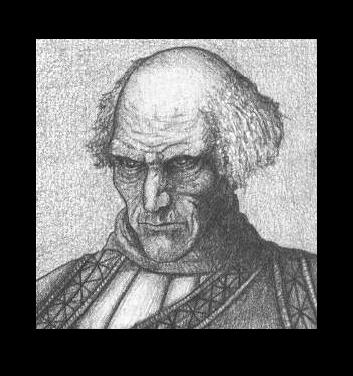Narses: Difference between revisions
No edit summary |
No edit summary |
||
| Line 1: | Line 1: | ||
; | ;[[Lasombra]] -V- [[Cainite Heresy]] -V- [[Venice -- medieval]] | ||
<br> | <br> | ||
[[File:Lasombra Narses.jpg]] | [[File:Lasombra Narses.jpg]] | ||
Revision as of 15:41, 16 February 2018
- Lasombra -V- Cainite Heresy -V- Venice -- medieval

Former Titles: Archbishop of Nod / Prince of Venice
Born: 478 A.D.
Embraced: 576 A.D.
Died: 1215 A.D.
Sire: Galerius
Progeny: Bishop Alfonzo of Venice, Guilelmo Aliprando, and Magdalena Castellucci Borcellino.
Appearance: Narses was Embraced in his late 90s, so he looked ruinously old. He spoke with a high pitched voice, especially when angry, due to his early castration. He was fond of the finest worldly trappings, including clothing, jewelry and weapons. He was extremely educated during his mortal lifetime and only became more so after his Embrace, thus, he possessed a personal library that surpassed that of many monasteries and was rivaled only by the universities of the Levant.
Background: A eunuch, Narses began his mortal career as commander of Justinian I's bodyguards. In time, he became Justinian's chamberlain and treasurer. On numerous occasions, Narses saved Justinian's throne both with timely military action or political bribes. So useful was he that Justinian eventually sent Narses to Italy not only to assist Belisarius, commander of the Byzantine forces there, but also to spy on him.
The two men disliked one another from the first. Their rivalry paralyzed military operations in Italy and led to the recapture of Milan by the Ostrogoths. Consequently, Justinian recalled Narses to Constantinople, lest the situation worsen. Nevertheless, Justinian soon placed Narses in command of operations against barbarians in the Balkans, and he won may victories there and in Italy.
Narses became exarch of Italy, serving until the death of Justinian I. However, Justinian's successor, Justin II, removed him from the exarchate. Embittered, Narses retired to a villa near Naples. There, he came to the attention of a Roman Lasombra named Galerius, who saw in him a perfect tool for his clan's ambitions. Galerius spent nearly a decade cultivating Narses before finally Embracing him. During that time, they worked together to undermine Byzantine authority in Italy, even to the point of providing the Lombards with military "advice" on how best to invade the peninsula. In the end, the old man welcomed the Embrace, as it gave him the opportunity to sate his voracious ambition and thirst for revenge -- as well as to continue his rivalry with Belisarius, whom the Byzantine Ventrue had Embraced a decade before.
Narses later returned to Constantinople to claim the charter for the portion of Byzantine Italy that had withstood the barbarian invasions, including Venice, where Narses ensconced himself as prince. He likewise took great interest in the still nascent Cainite Heresy, rising eventually to its head. His interest stemmed not from genuine faith in the Heresy's beliefs but from the realization that it could be a valuable tool for gaining yet more power. The twin desires to avenge himself upon Byzantium and acquire yet more power drove the entire course of his vampiric existence.
Personality: Narses had used his position both as prince of Venice and as Archbishop of Nod to lay the groundwork for another crusade, one that might somehow further his revenge against Constantinople. Although obsessed, Narses was methodical and patient. He took the long view of things, having spent almost 600 years establishing himself in Venice and within the Cainite Heresy. Consequently, he did not act rashly or without purpose. Neither did he operate openly, preferring to use agents and dupes to maintain an air of aloofness. He hoped by doing so to suggest that he was a fair judge and an honest broker.
His Final Death: In 1204 A.D., Narses, Archbishop of Nod, achieved his long delayed vengeance against Byzantium. Venice, the city over which he claimed dominion, helped tear Constantinople's walls down and burn her for days. The Byzantine Empire was all but destroyed, and the vampires of the Queen of Cities were either destroyed or made refugees. In the aftermath, Narses basks in his glory and sheds no tears for his vanquished enemy.
But, Narses was hardly the only powerful vampire in the Cainite Heresy. Many within the Crimson Curia, the order's ruling body, questioned Narses' dedication to the faith and his worthiness to lead it in the aftermath of the Fourth Crusade. Indeed, they were happy to let him pursue his vendetta when Michael the Archangel was a figure of some scorn in much of Europe, but the political landscape changed dramatically. With Michael becoming a martyr of sorts to so many vampires, the curia worried that the Heresy would be blamed for the "tragedy" of the Patriarch's destruction. Narses' vaunted political skills seemed to fail him as he did nothing to dissuade this perception.
After centuries of waiting, that moment of weakness was not something that Narses' rivals could pass up. Various members of the Crimson Curia, Lasombra from Genoa and even the Venetian Cappadocians formed an alliance of convenience and spread word that Michael's destruction was the result of an arrangement between Narses and a Baali witch. Several princes and other lords of the night, called blood hunts against this Baali, thought to be named Mary and to voice their displeasure with Narses.
In 1212, the Tzimisce Bishop Nikita of Sredetz (Sofia, Bulgaria) turns the Crimson Curia against the archbishop and had him divested of his mantle of authority. A call for the blood hunt soon follows, and Narses is forced to leave Venice. He finds few vampiric lords willing or able to shelter him, and he remains on the run. In 1213, his own lieutenant and childe Guilelmo Aliprando calls a court of blood and obtains from the Amici Noctis the right to diablerize him. By 1215, Guilelmo tracks Narses down, and commits upon him the Amaranth, thus taking his place as the prince of Venice.